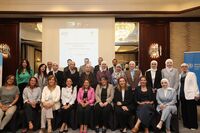February 26, 2026

In August, representing the Global Health Advocacy Incubator (GHAI), Dr. Veronica Schoj, Vice President for Food and Nutrition Policy participated in a pivotal four-day high-level meeting and technical workshop in Amman, Jordan, organized by the World Health Organization (WHO), the WHO country office in Jordan and Jordan’s Ministry of Health. The event, which forms part of the WHO Acceleration Plan to Stop Obesity, brought together government leaders, global experts and technical partners to advance strategies on front-of-pack labeling (FOPL) and restrictions on food marketing to children.
Dr. Schoj participated in the event alongside senior representatives from WHO and Jordan’s Ministry of Health. She shared global experiences on FOPL implementation, highlighting how countries have successfully designed, adopted and defended evidence-informed labeling systems and the evidence that demonstrates their positive impact to improve nutrition and public health.
Isabel Barbosa, Associate Director of the Global Center for Legal Innovation on Food Environments at Georgetown University’s O’Neill Institute, presented on the legal and regulatory frameworks underpinning FOPL and unpacked industry pledges in food marketing. Dr. Schoj also shared the growing global evidence base for protecting children from harmful advertising, managing conflicts of interest in policymaking and the important role civil society plays in the process. Together, these perspectives highlighted the importance of evidence, strong legal foundations and protection against industry interference in advancing effective healthy food policies.
The meeting also set out clear next steps and a roadmap for Jordan to adopt an evidence informed nutrient profile model, front of package warning labels and marketing restrictions of ultra-processed products. Expected outcomes include stronger coordination across sectors, greater awareness of these policies and improved knowledge-sharing on regulatory tools. The discussions further reinforced collaboration under Jordan’s National Nutrition Strategy and the National Acceleration Plan to Stop Obesity in line with WHO standards—anchoring the technical dialogue in the country’s existing commitments and long-term vision. Dr. Schoj noted the political momentum around these issues in Jordan and emphasized that the next phase must involve civil society organizations free from conflict of interest to support government’s leadership
These collaborations create opportunities for governments, WHO, international organizations and civil society to work together toward shared goals: healthier food environments and sustainable progress in the fight against diet-related noncommunicable diseases.



